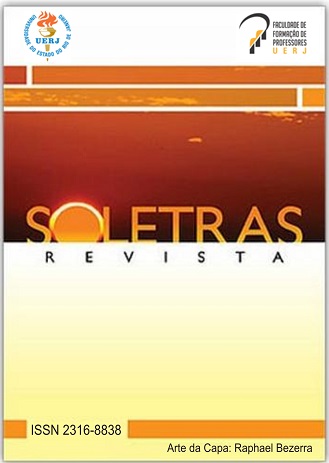O descentramento do sujeito pelo discurso e seus efeitos: relação entre o lugar social e a posição-sujeito no ato de dizer
DOI:
https://doi.org/10.12957/soletras.2024.84528Resumo
Neste trabalho, buscamos demostrar como o lugar social determina a posição-sujeito no discurso ao permutar pelas diferentes formações discursivas. Para isso, realizamos análises no discurso do então deputado estadual de São Paulo, Arthur do Val (Podemos), impulsionado pelo seu discurso de que as mulheres ucranianas são fáceis porque são pobres, para assim observarmos como o indivíduo é interpelado em sujeito se constitui discursivamente, descentrando-se, em seu de dizer, ao representar posições-sujeito diversas a partir do lugar social ocupado. Assim, analisamos o caso, ainda que não exaustivamente, em três situações distintas, quais sejam: a) um áudio compartilhado pelo WhatsApp, em que expõe uma visão machista sobre as mulheres ucranianas; b) o discurso de retratação pelo que disse no áudio; e c) o discurso de defesa no processo de cassação de seu mandato em decorrência do que disse no áudio. Nas análises, observamos que, ao transitar por formações discursivas diversas, o sujeito se dispersa em posições-sujeitos distintas, no impasse da heterogeneidade discursiva, possibilitando-o permutar de uma posição machista, passando por uma postura responsável, chegando a uma manobra combativa, na busca de se desvencilhar do peso da responsabilidade no processo de cassação do mandato que lhe é imputado em decorrência daquilo que proferiu.
Downloads
Publicado
Edição
Seção
Licença
A aprovação dos artigos implica a cessão imediata e sem ônus dos direitos de publicação nesta revista. O(s) autor(es) autoriza(m) ao Programa de Pós-graduação em Letras e Linguística (PPLIN) a reproduzi-lo e publicá-lo na revista SOLETRAS, entendendo-se os termos “reprodução” e “publicação” conforme definição do artigo 5° da Lei 9610/98. O(s) autor(es) continuará(rão) a ter os direitos autorais para publicações posteriores. O artigo poderá ser acessado pela rede mundial de computadores (http://www.e-publicacoes.uerj.br/index.php/soletras), sendo permitidas, a título gratuito, a consulta e a reprodução de exemplar do artigo para uso próprio de quem o consulta. Casos de plágio ou quaisquer ilegalidades nos textos apresentados são de inteira responsabilidade de seus autores.



